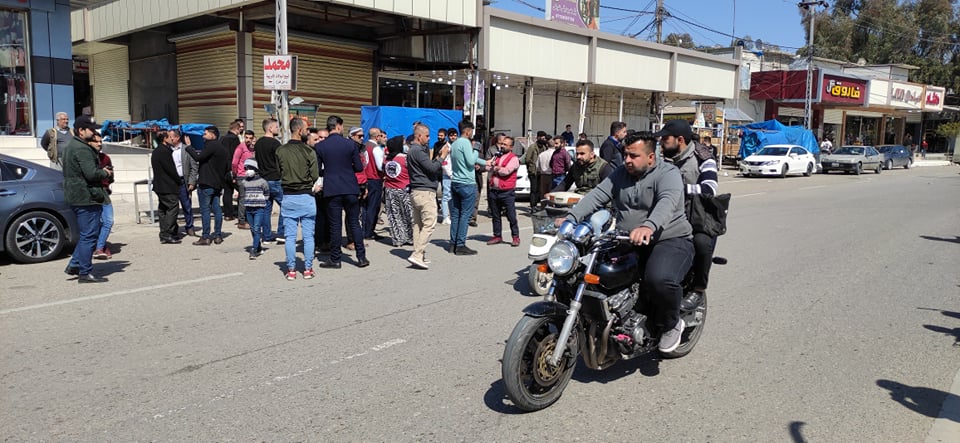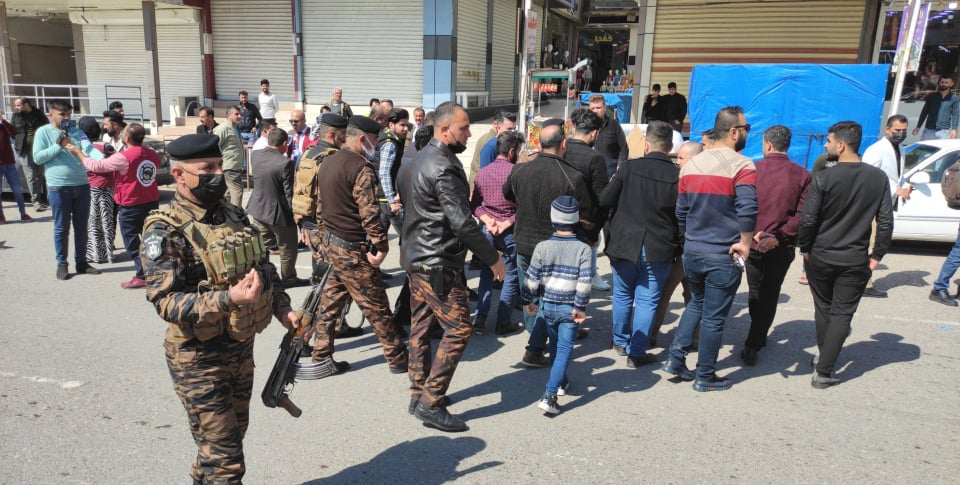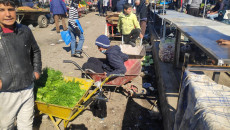Tens of store keepers in Hasiraka Bazar of Kirkuk Northern province have protested weekend lockdown imposed by local authorities upon instructions of the federal government and opened their stores yet local police forced the closure.
The owners of the stores gathered on March 13 in front of the bazar supported by Shqam groups, a local Ngo to defend the public interest.
Representative of the shops Arkan Ahmed said in a press conference that KirkukNow correspondent has attended they depend on the shops for their living and since the rent is high and in two weeks has to bring new season products.
“If they do not sell the goods have now, the loss will be huge so we call on Kirkuk Governor and Iraqi government to review this order. We have no profits since ethe last year due to the lockdown.”
“If they do not sell the goods have now, the loss will be huge so we call on Kirkuk Governor and Iraqi government to review this order. We have no profits since ethe last year due to the lockdown.”
It is the third time in the last weeks that shop keepers and street vendors protest the lockdown since the government is not compensating them for their incomes or losses.
Kirkuk Crisis Cell to fight Covid-19 imposed lockdown from Thursday 8 pm till Monday 5 am to limit the outbreak of Covid-19 variant registered last in February in Iraq.
Shaqam (Street) Group that defends public rights supports the demands of the shop keepers and offered tighter health restrictions and procedures to replace the lockdown. It called on the government to review its decision since it has made no positive change and hurt business of ordinary people.
The local police ordered police to force closure of the shops.
“We know it caused damage but the decision is not ours so we will deliver your message to the crisis cell and Kirkuk governor,” said Falah Yaychli, acting mayor of Kirkuk.
“We know it caused damage but the decision is not ours so we will deliver your message to the crisis cell and Kirkuk governor,” said Falah Yaychli, acting mayor of Kirkuk.
In mid-February, the high committee for national health and safety chaired by Iraqi Prime Minster has decided to implement full lockdown on Fridays, Saturdays and Sundays and night curfew from 8 pm to 5 am effective Feb. 18 to March 8 due to spike in Covid- 19 cases.
The restrictions included shutdown of schools, intercity travel ban, compulsory masking and social distancing in the public. All mosques and worship houses were closed except during prayer times. Funerals, parties and social gatherings were banned. The penalty for violation of social gathering is 5M Iraqi Dinars ($3,500). The shutdown covered malls, cafes, gyms, swimming pools, and cinemas.
Iraq has witnessed a spike in Covid-19 infection cases from 1000 cases a day in January doubled five times. On March 12, over 4,600 positive cases were registered and 25 fatalities, summing the total to over 750,0000, the daily stand by ministry of health shows.

Protest gathering by owners of Hasiraka stores on March 13, 2021 against lockdown. Photo by Karwan Salihi.
Similar protests were organized in Basrah and tension erupted between the store keepers and local police.
MPs urged the government to ease the restrictions and replace the lockdown with tighter precautions.
Rebwar Taha, member of Iraqi parliament from Kirkuk whom are tasked to monitor the province administration till a new provincial council is elected, said on March 12 that he supports demands of the vendors and sellers in Kirkuk and Basrah and the high committee to fight Covid-19 to review its instructions.
“There could be tighter restrictions and prevention procedures yet take daily life of people into consideration.”
On March 2nd, Iraq has received 50,000 jabs of Sinopharma from China distributed to all Iraqi provinces per population including Iraq's northern Kurdistan region. The spokesman of Iraqi ministry of health, said Iraq to receive 16m doses, adequate to vaccinate 20% of people.






